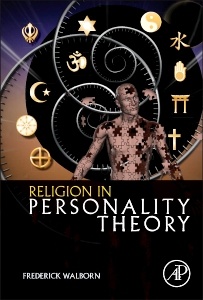Description
Religion in Personality Theory
Author: Walborn Frederick
Language: English
Subjects for Religion in Personality Theory:
Keywords
religiosity; spirituality; religious attendance; spiritual endorsement; comprehensive theory; oedipal; oceanic feelings; Documentary Hypothesis; totem; life instinct; numinosity; self; mandala; gnostic gospels; Job; archetypes; collective unconscious; synchronicity; inferiority; superiority; social interest; soft determinism; social support; forgiveness; prosocial behavior; adolescence; feminism and religion; real self; idealized self; moving toward; moving away; moving against; personality disorders; Zen Buddhism; trust; identity; integrity; Luther; Gandhi; morals; ethics; authoritarianism; conformity; authoritarian conscience; sado-masochistic tendencies; love; fundamentalism; social dominance; superstitious behavior; reinforcement; consequences; free will; determinism; master culture; modeling; spiritual self-efficacy; personal agency; proxy agency; collective agency; primitive religions; spirit possession; glossolalia; serpent handling; delay of gratification; Beyondism; trait; Five Factor Model; group mind; Theopsyche; self-actualization; peak experiences; religion versus science; mysticism; religion versus spirituality; meaning; logotherapy; transcendence; noÓ§logical dimension; responsibility; suffering; revelation; immature and mature religion; extrinsic and intrinsic religion; quest; attachment theory; social correspondence hypothesis; compensation hypothesis; IWM correspondence hypothesis; comprehensive theory; core characteristics; types; peripheral characteristics; developmental stages; developmental stages; developmental stages
456 p. · 15x22.8 cm · Hardback
Description
/li>Contents
/li>Readership
/li>Biography
/li>Comment
/li>
Religion in Personality Theory makes clear the link between theory and research and personality and religion. Presently, most personality texts have a limited discussion of religion and reference few theorists other than Freud and Maslow in relation to the subject. This book reviews the theory and the empirical literature on the writings of 14 theorists. Every chapter concludes with a summation of the current research on the theorist?s proposals.
Reviews:
"Frederick Walborn has written an excellent text that explores the degree to which classical personality theorists were personally influenced by and focused upon religion in developing their personality theories. Each theorist is presented in sufficient detail so that their personal views of religion are seen to influence the theories they developed. In addition, the current status of the empirical evidence in the psychology of religion is explored in the context of the theorist and theory to which the data is most relevant. Current and up to date, this text is appropriate for either a course in Personality or as an introduction to the Psychology of Religion. The author's own comprehensive theory of religion and spirituality creatively integrates the positive contributions of the classical personality theorist to the contemporary psychology of religion."
-Ralph W. Hood Jr., Professor of Psychology, University of Tennessee at Chattanooga
"In this interesting and accessible book, Frederick Walborn thoughtfully probes the place of religion and spirituality in the writings of a broad range of classical psychological thinkers and offers an insightful critique of current empirical research on the complex relation of religion and spirituality to individual well-being."
-Michele Dillon, Ph.D., Professor and Chair, Department of Sociology, University of New Hampshire, Durham, New Hampshire
1. Introduction2. Sigmund Freud3. Carl Jung4. Alfred Adler5. Karen Horney6. Erik Erikson7. Eric Fromm8. Burris Frederic Skinner9. Albert Bandura10. Walter Mischel11. Raymond Cattell12. Abraham Maslow13. Viktor Frankl14. Gordon Allport15. John Bowlby16. A Comprehensive Theory of Spirituality and Religion
Undergraduate and graduate students in counseling, pastoral counseling, psychology, or social work.
- Identifies what major personality theorists say about religion
- Investigates whether evidence supports or refutes predictions made by different theories
- Concludes with a comprehensive integrative theory on religion and spirituality




